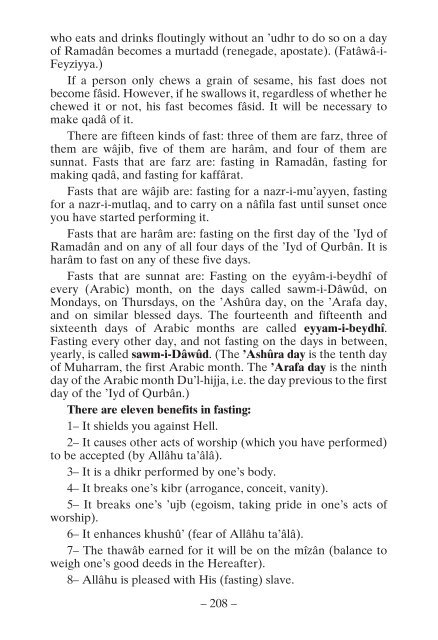Miftah-ul-Janna (Booklet for way to Paradise)
Create successful ePaper yourself
Turn your PDF publications into a flip-book with our unique Google optimized e-Paper software.
who eats and drinks floutingly without an ’udhr <strong>to</strong> do so on a day<br />
of Ramadân becomes a murtadd (renegade, apostate). (Fatâwâ-i-<br />
Feyziyya.)<br />
If a person only chews a grain of sesame, his fast does not<br />
become fâsid. However, if he swallows it, regardless of whether he<br />
chewed it or not, his fast becomes fâsid. It will be necessary <strong>to</strong><br />
make qadâ of it.<br />
There are fifteen kinds of fast: three of them are farz, three of<br />
them are wâjib, five of them are harâm, and four of them are<br />
sunnat. Fasts that are farz are: fasting in Ramadân, fasting <strong>for</strong><br />
making qadâ, and fasting <strong>for</strong> kaffârat.<br />
Fasts that are wâjib are: fasting <strong>for</strong> a nazr-i-mu’ayyen, fasting<br />
<strong>for</strong> a nazr-i-mutlaq, and <strong>to</strong> carry on a nâfila fast until sunset once<br />
you have started per<strong>for</strong>ming it.<br />
Fasts that are harâm are: fasting on the first day of the ’Iyd of<br />
Ramadân and on any of all four days of the ’Iyd of Qurbân. It is<br />
harâm <strong>to</strong> fast on any of these five days.<br />
Fasts that are sunnat are: Fasting on the eyyâm-i-beydhî of<br />
every (Arabic) month, on the days called sawm-i-Dâwûd, on<br />
Mondays, on Thursdays, on the ’Ashûra day, on the ’Arafa day,<br />
and on similar blessed days. The fourteenth and fifteenth and<br />
sixteenth days of Arabic months are called eyyam-i-beydhî.<br />
Fasting every other day, and not fasting on the days in between,<br />
yearly, is called sawm-i-Dâwûd. (The ’Ashûra day is the tenth day<br />
of Muharram, the first Arabic month. The ’Arafa day is the ninth<br />
day of the Arabic month Du’l-hijja, i.e. the day previous <strong>to</strong> the first<br />
day of the ’Iyd of Qurbân.)<br />
There are eleven benefits in fasting:<br />
1– It shields you against Hell.<br />
2– It causes other acts of worship (which you have per<strong>for</strong>med)<br />
<strong>to</strong> be accepted (by Allâhu ta’âlâ).<br />
3– It is a dhikr per<strong>for</strong>med by one’s body.<br />
4– It breaks one’s kibr (arrogance, conceit, vanity).<br />
5– It breaks one’s ’ujb (egoism, taking pride in one’s acts of<br />
worship).<br />
6– It enhances khushû’ (fear of Allâhu ta’âlâ).<br />
7– The thawâb earned <strong>for</strong> it will be on the mîzân (balance <strong>to</strong><br />
weigh one’s good deeds in the Hereafter).<br />
8– Allâhu is pleased with His (fasting) slave.<br />
– 208 –

















